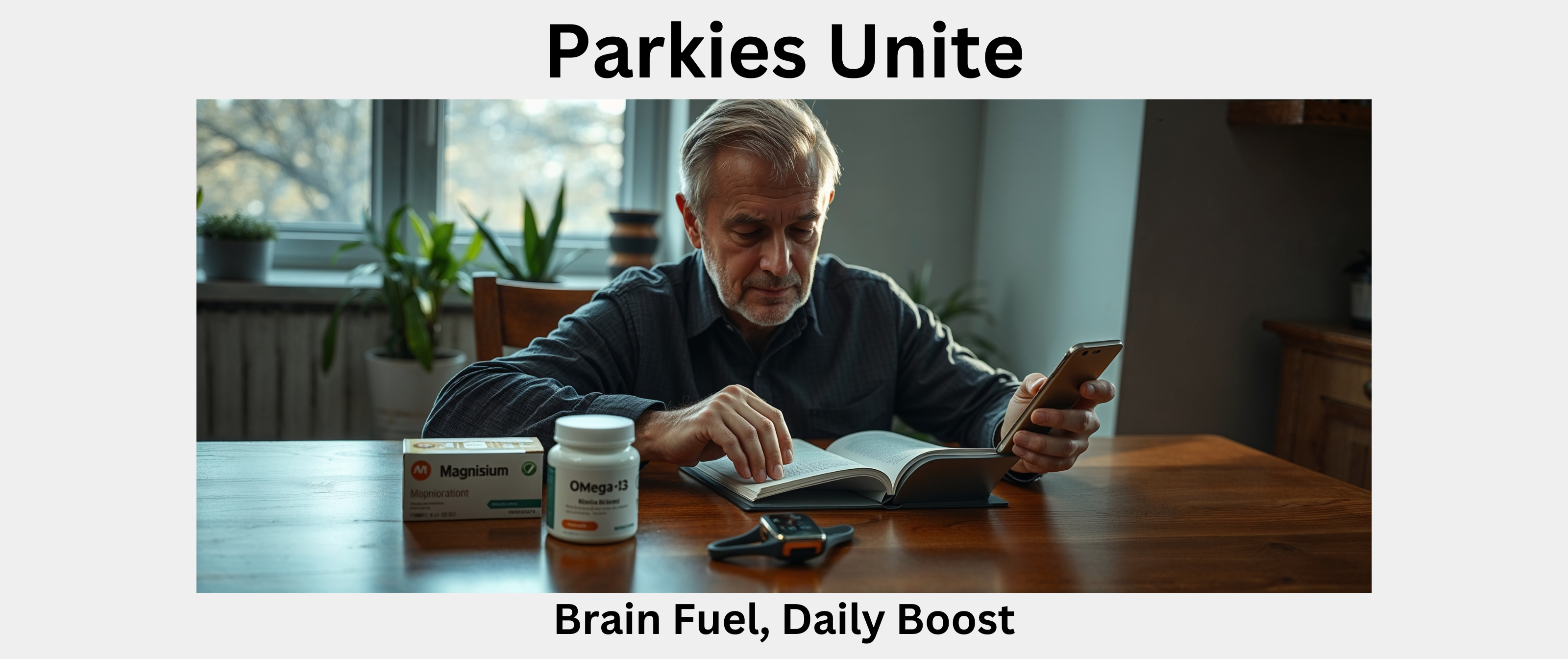Magnesium or Omega-3s?

When it comes to optimizing brain health and supporting those living with Parkinson’s disease (PD), two nutritional powerhouses consistently surface in medical conversations: magnesium and omega-3 fatty acids. Both are linked to cognitive function, inflammation control, mood regulation, and neuronal protection. But which one plays a more critical role in managing symptoms of Parkinson’s? Can they be used together? And how do they differ in how they support the brain?
In today’s Parkies Unite long-form blog, we walk through the insights from a comprehensive breakdown published by Health.com exploring magnesium versus omega-3s and how they relate to neurological wellness.
Keywords for Context
Parkinson’s disease, brain inflammation, magnesium benefits, omega-3 supplements, cognitive decline, neuronal health, stress regulation, mood support, DHA and EPA, magnesium-rich foods, ALA sources, voice biomarkers, wearable monitoring, gut-brain connection, PD nutrition tips, neuroprotection, AI Parkinson’s detection, digital assistants, lifestyle supplements, depression in Parkinson’s.
Step 1: Understanding the Brain’s Needs
The brain is a nutrient-hungry organ. For people living with Parkinson’s disease—where neurodegeneration and inflammation are central—getting the right support is crucial. Both magnesium and omega-3s contribute to brain health but in different ways.
Step 2: Omega-3s – The Brain’s Anti-Inflammatory Warriors
Omega-3 fatty acids, especially DHA (docosahexaenoic acid) and EPA (eicosapentaenoic acid), are essential fats that our body can’t make on its own. They must come from the diet or supplements.
Benefits of Omega-3s for Parkinson’s:
- Cognitive Function & Brain Structure: Omega-3s help maintain the fluidity of cell membranes and are vital to brain development and repair. They’ve been linked to slower cognitive decline and may help delay progression in neurodegenerative diseases.
- Mood Stabilization: Several studies connect higher intake of omega-3s with reduced symptoms of depression and anxiety, common non-motor symptoms in Parkinson’s.
- Anti-Inflammatory Protection: Chronic brain inflammation is now seen as a key driver of Parkinson’s progression. Omega-3s actively regulate inflammatory responses, especially microglial activity in the brain.
- Neuronal Signaling & Neuroplasticity: Omega-3s assist in strengthening synapses and improving communication between neurons, which may contribute to better motor control.
Step 3: Magnesium – The Unsung Hero of Brain Chemistry
Magnesium is involved in more than 300 enzymatic reactions, including those essential for neurotransmission, muscle coordination, and mood stability.
Benefits of Magnesium for Parkinson’s:
- Neurotransmitter Regulation: Magnesium supports the activity of neurotransmitters like dopamine, which is critically depleted in Parkinson’s.
- Stress and Anxiety Relief: It plays a role in regulating the hypothalamic-pituitary-adrenal (HPA) axis, helping the body respond to stress. People with low magnesium often report heightened anxiety and difficulty relaxing.
- Anti-Inflammatory Effects: Like omega-3s, magnesium reduces neuroinflammation. A deficiency may exacerbate oxidative stress and mitochondrial dysfunction in PD.
- Muscle Function and Sleep: It aids in muscle relaxation and may ease Parkinson’s-related muscle cramps or restless leg syndrome. Additionally, it promotes better sleep by regulating melatonin.
Step 4: Dietary Sources and Supplement Considerations
Omega-3 Sources:
- Animal-Based: Salmon, mackerel, sardines, herring, and anchovies.
- Plant-Based: Flaxseeds, chia seeds, walnuts, and hemp seeds (contain ALA).
- Supplement Tip: Choose high-quality fish oil or algae-based DHA/EPA for plant-based options.
Magnesium Sources:
- Leafy Greens: Spinach, Swiss chard, kale.
- Nuts and Seeds: Almonds, pumpkin seeds, cashews.
- Whole Grains and Legumes: Quinoa, black beans, lentils.
- Supplement Tip: Magnesium glycinate or citrate is better absorbed and gentler on digestion.
Step 5: The Verdict — Which One for Parkinson’s?
It’s not a battle. It’s a partnership.
Both magnesium and omega-3s work synergistically to support cognitive and emotional health. For people with Parkinson’s, integrating both into your daily nutrition strategy may help reduce inflammation, stabilize mood, improve sleep, and support neuronal resilience.
Step 6: Practical Integration Into Parkinson’s Care
- Use wearables and symptom trackers to log mood, sleep quality, and “off” times. This helps detect patterns after dietary or supplement changes.
- Talk with your neurologist before starting any new supplement—especially if you’re taking blood thinners (omega-3s can affect clotting) or diuretics (which may lower magnesium).
- Combine with lifestyle tools like spiral drawing apps, speech monitors, and digital assistants to track non-motor symptoms. These AI tools are increasingly being used to assess early Parkinson’s symptoms such as vocal changes, bradykinesia, and gait abnormalities at home.
Final Thoughts
Parkinson’s care is no longer limited to just medication. Nutritional neuroscience is emerging as a powerful ally—and magnesium and omega-3s are two of the best-studied nutrients in that toolkit.
Whether you’re using a tablet to draw spirals, wearing a gait sensor, or simply enjoying a walnut-spinach salad—know that small daily choices can build long-term cognitive and emotional strength.
Photo-realistic AI Image Prompt:
A middle-aged man sitting at a home workspace using a tablet with a spiral drawing test on screen, while a wearable gait sensor is strapped to his ankle. A digital assistant interface showing voice waveform is visible on a second screen nearby. Bright natural lighting, modern yet lived-in home environment, subtle medical cues like pill organizers or walking cane in background.
Taglines:
Brain Fuel, Daily Boost
Parkinson’s Smart Tools
Wellness Starts with Food
Negative prompt:
Malformed limbs, extra limbs, mutated hands, disfigured face, bad anatomy, malformed hands, Text, lettering, captions, generating images with text overlays
AI-generated medical infographics on Parkinson’s symptoms, treatment advances, and research findings; I hope you found this blog post informative and interesting. www.parkiesunite.com by Parkie
Keywords: omega-3 supplements, magnesium benefits, Parkinson’s disease, brain health, cognitive support